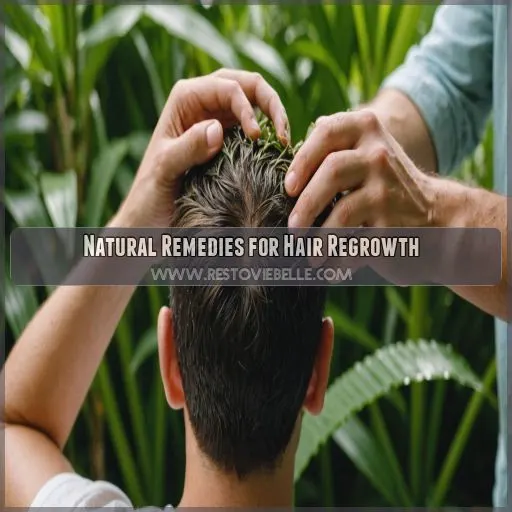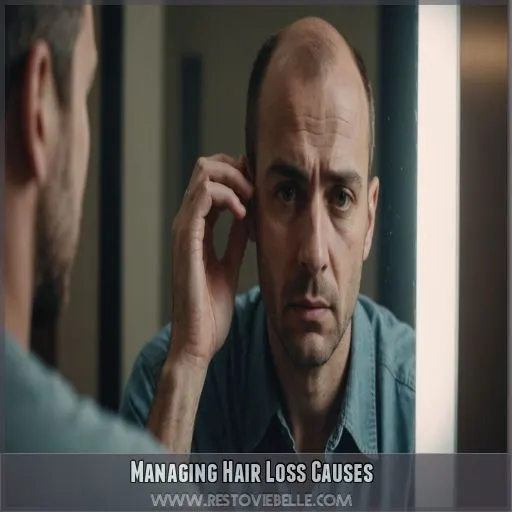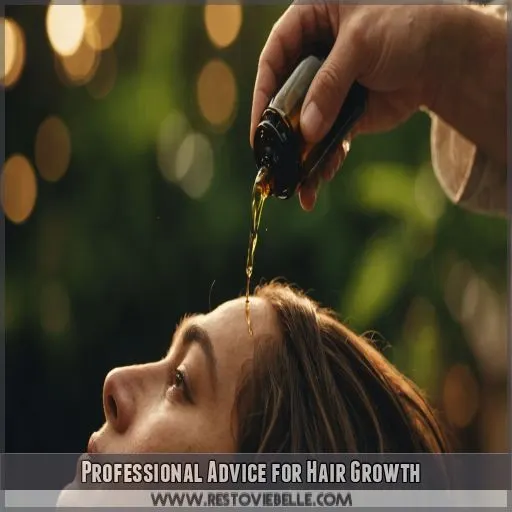This site is supported by our readers. We may earn a commission, at no cost to you, if you purchase through links.
 Looking for home remedies for hair growth? You’re not alone! Many of us dream of luscious locks, but before you raid your pantry, let’s get real.
Looking for home remedies for hair growth? You’re not alone! Many of us dream of luscious locks, but before you raid your pantry, let’s get real.
While there’s no magic potion, some natural remedies might give your hair a boost.
Scalp massages, aloe vera, and coconut oil are popular options that could stimulate growth and strengthen your strands.
Don’t forget the power of a balanced diet – your hair loves nutrients like biotin and omega-3s.
Stress less, sleep more, and maybe try a dash of onion juice (just don’t blame us for the smell!).
Ready to explore more hair-raising solutions?
Table Of Contents
- Key Takeaways
- Natural Remedies for Hair Regrowth
- Hair Growth Tips and Strategies
- Managing Hair Loss Causes
- At-Home Hair Growth Methods
- Professional Advice for Hair Growth
- Frequently Asked Questions (FAQs)
- How can I make my hair grow faster at home naturally?
- Which home remedy is best for hair regrowth?
- How can I grow my hair long naturally?
- How to get thicker hair naturally?
- Can stress-induced hair loss be reversed naturally?
- How does diet affect hair growth and quality?
- Are there any exercises that stimulate hair growth?
- Can certain hairstyles promote faster hair growth?
- Do scalp exfoliation treatments enhance hair regrowth?
- Conclusion
Key Takeaways
- You’ve got options in your kitchen cupboard, but don’t expect miracles. Natural remedies like scalp massages, aloe vera, and coconut oil might give your hair a boost, but they’re not magic potions. Think of them as a spa day for your scalp – enjoyable and potentially beneficial, but not a guaranteed cure for baldness.
- Your diet plays a starring role in your hair’s health story. Load up on iron-rich foods, zinc-fortified grains, and foods packed with vitamins B-12 and D. It’s like feeding your follicles a five-star meal – they’ll thank you with stronger, healthier growth.
- Stress less, sleep more, and your hair might just throw you a party. Chronic stress and lack of shut-eye can be real party poopers for your hair. Try meditation, yoga, or whatever helps you unwind. Your hair (and probably your sanity) will appreciate the break.
- When in doubt, call in the pros. If you’ve tried every home remedy under the sun and your hair’s still playing hard to get, it might be time to consult a dermatologist. They can help you get to the root of the problem (pun intended) and create a personalized plan for your mane.
Natural Remedies for Hair Regrowth
Natural remedies are a great way to boost hair regrowth. From scalp massages to aloe vera treatments, there’s a range of options to try that are backed by evidence, offering hope to those struggling with hair loss.
Benefits of Scalp Massages for Hair Growth
Scalp massages are a simple, drug-free way to support hair growth.
It feels good and may help your hair, too.
By stimulating your scalp, you encourage blood flow to the area, which can promote thicker hair.
There are no quick fixes for hair loss, but regular scalp massages are an easy, enjoyable habit to add to your routine.
Just a few minutes of daily massage may help strengthen your hair game.
How Aloe Vera Promotes Hair Regrowth
Aloe vera is a hair hero. It’s soothing and moisturizing, like a spa treatment for your scalp.
But does it boost hair growth? Well, it’s no miracle cure, but it has perks.
Aloe vera gel is anti-inflammatory, reducing dandruff and calming angry follicles. This unclogs pores, letting hair breathe and grow.
It’s also a natural conditioner, strengthening hair and preventing breakage.
Coconut Oil’s Role in Hair Regrowth
Coconut oil is a go-to natural remedy for hair regrowth, and here’s why:
- Hair Hydrator: Coconut oil penetrates the hair shaft, reducing protein loss and keeping your mane strong and supple.
- Scalp Savior: It soothes the scalp, maintaining a healthy environment for hair to thrive.
Viviscal’s Ingredients for Hair Regrowth
Considering Viviscal for hair growth? Its ingredients, including biotin, vitamin C, and zinc, can help regenerate and strengthen cells. While some users report benefits, others experience side effects like stomach upset. Weighing the pros and cons, Viviscal may be a viable option, but consult a doctor before adding it to your hair growth routine.
Fish Oil’s Effectiveness for Hair Growth
You’re looking for a natural way to boost hair growth, and fish oil is worth considering.
Fish oil is rich in omega-3 fatty acids, which can reduce inflammation and promote a healthy scalp.
While it won’t work miracles, fish oil supplements can support hair growth.
Just remember, it’s part of a bigger puzzle – combine it with a balanced diet and good scalp care for the best results.
Ginseng’s Benefits for Hair Growth
You’re looking for a natural boost to your hair growth? Ginseng might be your answer! Red ginseng, in particular, has been shown to stimulate hair follicles and improve scalp health. Panax ginseng, another type, may even help prevent hair loss. While it’s no magic bullet, ginseng can be a useful addition to your hair growth toolkit.
Onion Juice’s Role in Promoting Hair Growth
Now, let’s talk about onion juice – a natural remedy that’s gaining popularity for promoting hair growth. Rich in antioxidants and sulfur, onion juice can stimulate hair follicles, improve scalp health, and even treat alopecia areata. Mix equal parts onion juice and coconut oil for a potent hair mask. Leave it on for 30 minutes before rinsing for best results.
Hair Growth Tips and Strategies
You’re probably wondering what else you can do to boost hair growth beyond trying out natural remedies. The truth is, there’s no single magic method to make your hair grow faster, but combining different approaches like scalp massage, supplements, and a nutritious diet may just do the trick.
Combining Methods for Optimal Results
Now that you’ve got a handle on natural remedies, let’s talk about combining methods for the best results.
Pair scalp massages with supplements like biotin and vitamin D.
Don’t forget a balanced diet rich in omega-3s.
Add some aromatherapy with rosemary oil and carrier oils like coconut or jojoba.
Experiment with polyherbal ointments, holy basil, and emblica officinalis for an extra boost.
Importance of a Multidirectional Approach
You’re tackling hair loss, and it’s time to get strategic. A multidirectional approach is key. Combine scalp massages, supplements, and hair oils with medical treatments like minoxidil. Don’t put all your eggs in one basket – mix and match to find what works for you. Be patient, and remember, holistic hair care is a journey, not a quick fix.
Role of Nutrition in Hair Growth
A healthy diet is key to strong, vibrant hair. Nutrient deficiencies can lead to hair loss, so make sure your diet includes:
- Iron-rich foods: Think dark, leafy greens, beans, and lean red meat. Iron deficiency is a common cause of hair loss, so keep those levels in check.
- Zinc-fortified foods: Whole grains, nuts, and legumes are great sources of zinc, a mineral important for hair growth.
- Vitamin B-12 sources: Meat, fish, dairy, and eggs provide vitamin B-12, essential for healthy hair.
- Vitamin D: Fatty fish and egg yolks are good sources of vitamin D, which may aid hair growth.
How to Use Essential Oils for Hair Growth
Essential oils can be a helpful tool for hair growth.
Geranium oil, for example, is known to promote hair growth and boost circulation.
You can mix it with carrier oils like sweet almond, jojoba, or wheat germ oil before applying it to your hair.
Remember to do a patch test first to avoid any irritation.
You can also add a few drops of rosemary or lemon oil to your shampoo or conditioner for added benefits.
These essential oils can act like an energizing boost for your hair follicles!
Benefits of Aromatherapy for Hair Growth
Now that you know how to use essential oils for hair growth, let’s explore the benefits of aromatherapy. Aromatherapy can help reduce stress, a major contributor to hair loss. By incorporating aromatherapy into your scalp care routine, you can promote hair health and growth. Here are some herbal salves to try:
- Ocimum sanctum (Holy Basil) for stress relief
- Tridax procumbent for antioxidant benefits
- Bacopa monnieri for improved circulation
Managing Hair Loss Causes
Genes, hormones, and health issues can team up against your hair, causing it to thin or fall out. Let’s explore these common causes of hair loss and how to manage them.
Understanding Genetic Hair Loss
Genetics play a huge role in hair loss. You might’ve heard the old saying, "It’s in your genes." While this is often said in jest, there’s truth to it when it comes to your hair.
| Type of Hair Loss | Description |
|---|---|
| Androgenic Alopecia | The technical term for male/female pattern baldness, caused by an increase in androgen hormones. |
| Hereditary Hair Loss | Passed down from parents; can be from one or both sides of the family. |
| Male Pattern Hair Loss | Receding hairline and thinning at the crown; often starts in the teens or 20s. |
| Female Pattern Hair Loss | Thinning hair, usually on the top third of the scalp, often after menopause. |
Autoimmune Diseases and Hair Loss
Your body can mistake hair follicles as foreign invaders, leading to hair loss. Alopecia areata is one such autoimmune disease. Here are some tips to manage hair loss caused by autoimmune diseases:
- Get a firm hair loss diagnosis: Alopecia areata symptoms can be similar to telogen effluvium (stress-related hair loss). A dermatologist can help distinguish between the two.
- Treat the underlying disease: Autoimmune treatment aims to suppress your overactive immune system.
- Manage stress: Hair loss triggers include stress. Managing stress through therapy or support groups can help.
Hormonal Imbalances and Hair Loss
Hormonal imbalances can wreak havoc on your hair. For women, postpartum hair loss, menopause, and PCOS can all trigger hair loss. Don’t panic! Stress management and hormone-regulating treatments like finasteride or minoxidil can help. If you’re experiencing hormonal hair loss, talk to your doctor about finding a solution that works for you.
Thyroid Conditions and Hair Loss
Thyroid conditions can cause hair loss, and it’s important to understand the link between the two. Here’s the lowdown:
- Thyroid issues can lead to hair loss, but managing your condition with medication can promote hair growth.
- Hormone disruptions, specifically T3 and T4, affect hair growth at the root.
- Autoimmune conditions like alopecia are often linked to thyroid issues and can cause hair loss.
- Both overactive and underactive thyroid conditions can contribute to hair loss.
- Medications for thyroid conditions may also cause hair thinning, so it’s a good idea to talk to your doctor about any concerns.
Vitamin Deficiencies and Hair Loss
You’ve probably heard that vitamin deficiencies can lead to hair loss. But which ones? Iron, zinc, and biotin deficiencies are common culprits. If you’re experiencing hair loss symptoms, check your diet for gaps. Boost iron with spinach and beans, zinc with oysters and nuts, and biotin with eggs and whole grains. A balanced diet can help prevent hair loss.
At-Home Hair Growth Methods
You’re probably tired of trying every hair growth remedy under the sun, only to be left with a thinner wallet and a still-thin head of hair. Let’s cut through the noise and explore some at-home hair growth methods that actually have some science backing them up.
How to Use Minoxidil for Hair Growth
You’re considering minoxidil for hair growth! Topical minoxidil, also known as Rogaine, can be effective, but be aware of potential side effects like itching and initial shedding. Apply it correctly: 1-2% solution, 1-2 times a day, and massage it in. Consult a dermatologist before starting, especially if you’re a woman or using it for beard growth.
Benefits of Scalp Massage at Home
Massaging your scalp at home can be a game-changer for hair growth. Using scalp massage tools or even just your fingertips can increase blood flow and stimulate hair follicles. Try massaging with olive or walnut oil 2-3 times a week for 5-10 minutes. Be gentle, and don’t overdo it – consistency is key to seeing benefits.
How to Reduce Stress for Hair Growth
Stress can really mess with your hair growth. High stress levels can lead to hair loss, so it’s important to find ways to chill out. Try these stress-busting techniques:
- Meditation for Hair: Practice mindfulness meditation to reduce stress and promote hair growth.
- Yoga for Hair: Regular yoga practice can help reduce stress and improve overall health.
- Relaxation Exercises: Engage in activities that bring you joy and help you relax, such as reading or walking.
Importance of Sleep for Hair Growth
You’re probably no stranger to sleep deprivation, but did you know it can affect hair growth? During sleep, your body repairs and regenerates hair follicles. Lack of sleep can disrupt the hair cycle, leading to hair loss. Aim for 7-8 hours of sleep per night to help promote hair growth. Consult a dermatologist if you’re struggling with hair loss.
Nutrition Tips for Hair Growth at Home
Now that you’re sleeping like a baby, let’s talk about fueling your hair growth with the right foods! Eat hair-boosting foods like salmon, spinach, and almonds, rich in omega-3 fatty acids, iron, and biotin. A balanced diet can help address nutrient deficiencies, promoting healthy hair growth. Consider supplements like vitamin D and zinc gluconate to support your hair growth journey.
Professional Advice for Hair Growth
You’ve tried the at-home remedies, but your hair’s still not cooperating – it’s time to bring in the experts. Consulting a dermatologist can help you identify the underlying cause of your hair loss and create a personalized plan to get your locks growing again.
When to Consult a Dermatologist
Time to call in the experts! If you’re struggling with hair loss, it’s a good idea to see a dermatologist to figure out what’s going on. Before your visit, jot down:
- List of medications and supplements
- Hair loss timeline
- Relevant medical history
- Questions about hair loss solutions for your skin type
This will help your dermatologist put together a plan just for you.
Benefits of Over-the-Counter Minoxidil
You’re considering over-the-counter minoxidil for hair growth. That’s a great start! Minoxidil, also known as Rogaine, can be effective for both men and women. However, be aware of potential side effects like initial shedding and scalp irritation. Results vary, but it’s a viable option for many. Always follow the instructions and consult a dermatologist if you have concerns.
How to Choose the Right Supplements for Hair Growth
Now that you’ve considered over-the-counter minoxidil, let’s talk supplements. Choosing the right ones can be overwhelming, but don’t worry, we’re here to help. Here are some essentials to look for:
- Biotin: strengthens hair follicles
- Vitamins: promotes healthy hair growth
- Zinc: regulates hair loss
- Chinese hibiscus: may help promote hair growth and reduce dandruff
Importance of Reviewing Medication for Hair Loss
Here’s the deal: your medication might be secretly sabotaging your hair growth. Certain prescription meds can trigger hair loss as a side effect. Don’t freak out! Review your prescriptions with your doctor to identify potential hair loss culprits. Be aware of medication interactions and side effects, and ask about alternatives that won’t mess with your mane.
Preparing for a Dermatologist Consultation
Before seeing a dermatologist, prep a list of your medications, a timeline of hair loss, and any relevant medical history. Write down consultation questions, like "What’s causing my hair loss?" or "What treatments do you recommend?" Bring doctors’ notes and test results, if any. Having a prepare checklist will help you make the most of your consultation.
Frequently Asked Questions (FAQs)
How can I make my hair grow faster at home naturally?
You can’t speed up hair growth, but you can support healthy growth. Try scalp massages, eat a balanced diet, and use gentle hair care. Remember, patience is key – your hair’s on its own timeline!
Which home remedy is best for hair regrowth?
Imagine your scalp as a garden, ready for growth. You’ll find no one-size-fits-all solution, but scalp massages, aloe vera, and coconut oil often yield promising results. Experiment to discover what works best for your unique hair needs.
How can I grow my hair long naturally?
You can’t speed up hair growth, but you can nurture it. Focus on a balanced diet, gentle hair care, and scalp massages. Patience is key – your mane’s on its own timeline, so treat it with TLC.
How to get thicker hair naturally?
Like nurturing a garden, thickening your hair naturally takes time and care. You’ll want to massage your scalp daily, eat a nutrient-rich diet, and try natural remedies like aloe vera or rosemary oil. Patience is key!
Can stress-induced hair loss be reversed naturally?
Yes, you can often reverse stress-induced hair loss naturally. Try scalp massages, stress-reduction techniques like meditation, and a balanced diet. Remember, your hair’s just taking a breather—it’ll bounce back when you’re feeling zen again!
How does diet affect hair growth and quality?
Like Rapunzel’s magical locks, your diet can work wonders for your hair. You’re what you eat, so feed your follicles well. A balanced diet rich in proteins, vitamins, and minerals will nourish your mane from within.
Are there any exercises that stimulate hair growth?
While there’s no magic workout for your locks, scalp massages and yoga inversions might give your hair a boost. They improve blood flow to your scalp, potentially nourishing those follicles. Don’t expect miracles, but every little bit helps!
Can certain hairstyles promote faster hair growth?
While no hairstyle directly speeds up growth, some can protect your hair from damage. Loose styles like braids or buns reduce breakage, giving the illusion of faster growth. But don’t pull too tight—that’ll backfire!
Do scalp exfoliation treatments enhance hair regrowth?
You might hear scalp exfoliation‘s the secret sauce for luscious locks, but hold your horses! While it can remove dead skin cells, there’s no solid proof it boosts hair growth. It’s worth a try, but don’t expect miracles.
Conclusion
Who knew your kitchen could double as a hair salon?
While home remedies for hair growth might not turn you into Rapunzel overnight, they’re worth a shot.
From scalp massages to onion juice concoctions, you’ve got options.
Combine these natural methods with a healthy lifestyle, and you might just see some extra shine and length.
But if your hair loss concerns persist, don’t hesitate to consult a pro.
Your luscious locks await!











